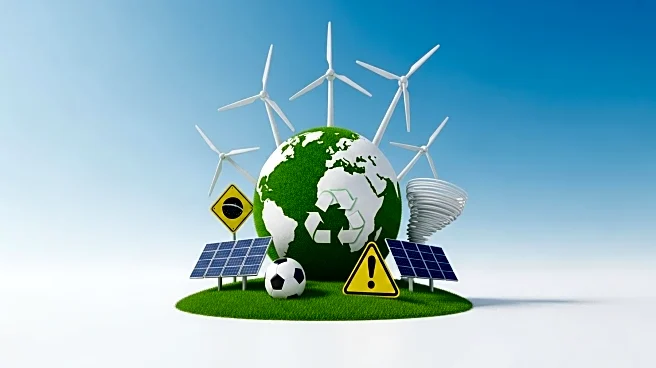What's Happening?
Spanish schools are set to introduce lessons on coping with natural disasters as part of a new educational initiative aimed at preparing students for the impacts of climate change. The program, announced by the education ministry, will cover a range of emergency situations including floods, wildfires, earthquakes, and volcanic eruptions. This initiative comes in response to recent catastrophic events in Spain, such as forest fires and floods, which have resulted in significant loss of life. The curriculum will be mandatory for over 8 million children across 25,000 schools, utilizing various media to teach students how to respond safely and effectively to emergencies. The program also aims to educate students on distinguishing between information and disinformation during crises.
Why It's Important?
This educational initiative is significant as it represents a proactive approach to equipping the younger generation with the skills needed to navigate the increasing frequency and severity of climate-related disasters. By integrating these lessons into the school curriculum, Spain is addressing the urgent need for climate resilience and preparedness among its citizens. The program not only aims to protect lives but also to foster a culture of awareness and responsibility towards environmental challenges. As climate change continues to pose threats globally, Spain's approach could serve as a model for other countries seeking to enhance their educational systems in response to environmental crises.
What's Next?
The lessons are scheduled to begin this school year, with Spain's self-governing regions having the flexibility to tailor the training to specific local risks. The initiative is part of a broader 10-point plan to combat climate change, with Prime Minister Pedro Sánchez calling for a 'great state pact' to unite political and public efforts in addressing the climate crisis. The success of this program may influence future educational policies and climate strategies both within Spain and internationally.
Beyond the Headlines
The introduction of climate crisis education in schools highlights the ethical responsibility of governments to prepare future generations for environmental challenges. It also underscores the importance of integrating scientific knowledge and critical thinking into education to combat misinformation during emergencies. This initiative may lead to long-term cultural shifts in how societies perceive and respond to climate change.









